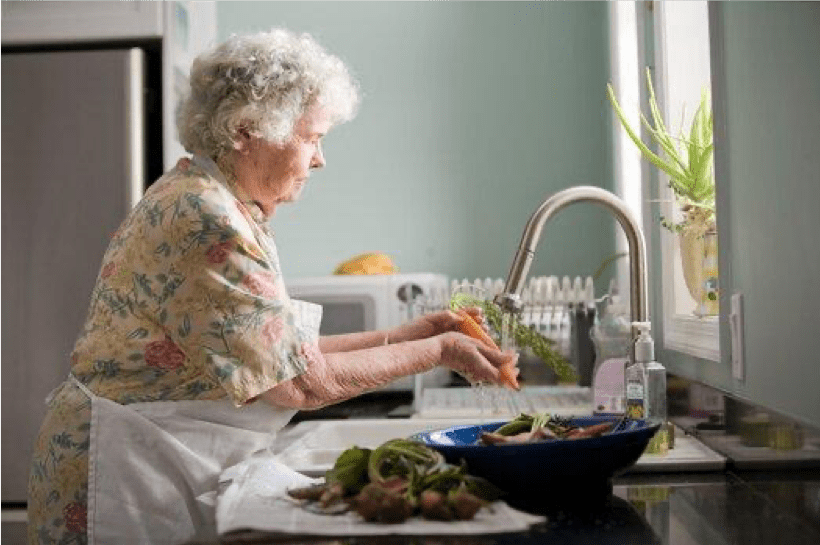By: Madison Boissiere, Undergraduate Student in Food Science and Human Nutrition at the University of Illinois Urbana-Champaign.
How Aging Affects Diet
Eating healthy as an older adult is essential for improving and maintaining a high quality of life. However, older individuals are more likely to face difficulties when it comes to their health. Changes in appetite are often seen in older adults due to aging and can directly affect food intake regardless of health status. A lack of appetite can quickly lead to malnutrition and can lead to severe consequences when unaddressed. Therefore it is important to understand the changes and adjustments happening within the body to help control the dietary choices one makes in their daily life. Here are some of the major changes happening as adults age:
Slowed metabolism: Adults over the age of 40 will experience a slower metabolism due to muscle loss, reduced physical activity, and the natural aging of the metabolic process. This makes it incredibly important for adults to focus on maintaining muscle and having an active lifestyle to avoid weight gain.
Diminished taste and smell: Senses begin to weaken during aging and sensitivity to salty and bitter foods are the first to diminish. Individuals may be inclined to add an excessive amount of salt to compensate for loss of taste. However, better options would include adding herbs, spices, and oils to boost flavor. Medications have also been shown to interfere with taste which can also lead to overconsumption of salt and sugar.
Social and emotional changes: Oftentimes, older adults face loneliness and depression as a result of social isolation, leading to either overeating or under eating. In these instances, it can be helpful to reach out to family, friends, or neighbors to share a meal together. It can also help to schedule a set day of the week dedicated to eating with a loved one as something to look forward to throughout the week.
Strategies for Healthy Eating as an Older Adult
Healthy eating shouldn’t be about dieting and sacrificing the things you love. Instead, focus on incorporating fresh, whole foods into the meals you already enjoy. The impact that wholesome ingredients will have on your body will make a noticeable change to your physical and mental state. Here are a few ways to get started on optimal eating habits as an older adult:
Eat quality foods: Aim to fill half of your plate with fruits or vegetables, a quarter with whole grains like quinoa or whole wheat bread, and another quarter with lean protein such as eggs, chicken, or fish. Make veggies more appealing by adding olive oil, chili flakes, garlic, or cheese. Focus on varying your sources of protein and avoiding processed meats like hot dogs, bacon, and deli meat which can increase the risk of heart disease and cancer.
Choose foods with high calcium content: Bone health tends to deteriorate as we age, so it is incredibly important to incorporate foods with calcium in order to prevent osteoporosis and bone fractures. Foods such as milk, cheese, kale, spinach, almonds, yogurt, and bread with fortified flour are all great sources of calcium.
Increase vitamin B and D intake: As we age, the stomach decreases gastric acid production, making it more difficult to absorb vitamin B12 which is essential for blood and nerve health as well as energy. It is recommended to take 2.4 micrograms of vitamin B12, which can be found in fortified foods or supplements. The skin also becomes less efficient at absorbing vitamin D, meaning you must focus on incorporating it into the diet with foods like fatty fish, egg yolks, and fortified foods.
Eat more fiber: Fiber has a significant amount of health benefits like decreasing the risk of heart disease and diabetes, as well as improving digestion and weight loss. Women over 50 are recommended to eat 21 grams of fiber a day. While men over 50 should be getting at least 30 grams a day. Most people do not even consume half these amounts, so it is especially important to focus on including foods in the diet that contain fiber.
Choose carbs wisely: Whole grain foods provide more nutritional benefits than processed grains, however, processed grains can be appealing to many older adults due to their sweet taste. Try to limit the amount of simple carbs in the diet to avoid spikes in blood pressure and energy crashes throughout the day.
Portion sizing: Paying attention to portion size can be beneficial whether you want to lose weight or gain weight. If you are trying to lose weight, consider cutting down the amount of food you are eating rather than cutting out food groups as a whole. For gaining weight, consider making bigger meals for yourself especially if you find yourself snacking on foods high in sugar and unsaturated fat often.
Healthy eating is important at all stages of life, but especially in the older years when the body needs extra nutrients and care. It is never too late to incorporate healthy eating habits into your life. You will feel stronger, live longer, and feel happier by incorporating these lifestyle changes into your life. Get started now!
References
- Robinson, Lawrence, and Jeanne Segal PhD. “Eating Well as You Age.” HelpGuide.org, www.helpguide.org/articles/healthy-eating/eating-well-as-you-age.htm.
- McManus, Katherine R.D “Healthy Eating for Older Adults.” Harvard Health Blog, 5 June 2019, www.health.harvard.edu/blog/healthy-eating-for-older-adults-2019062016868.
- Raman, Ryan MS, RD “Why Your Metabolism Slows With Age.” Healthline, https://www.healthline.com/nutrition/metabolism-and-age
Photo by Unsplash













